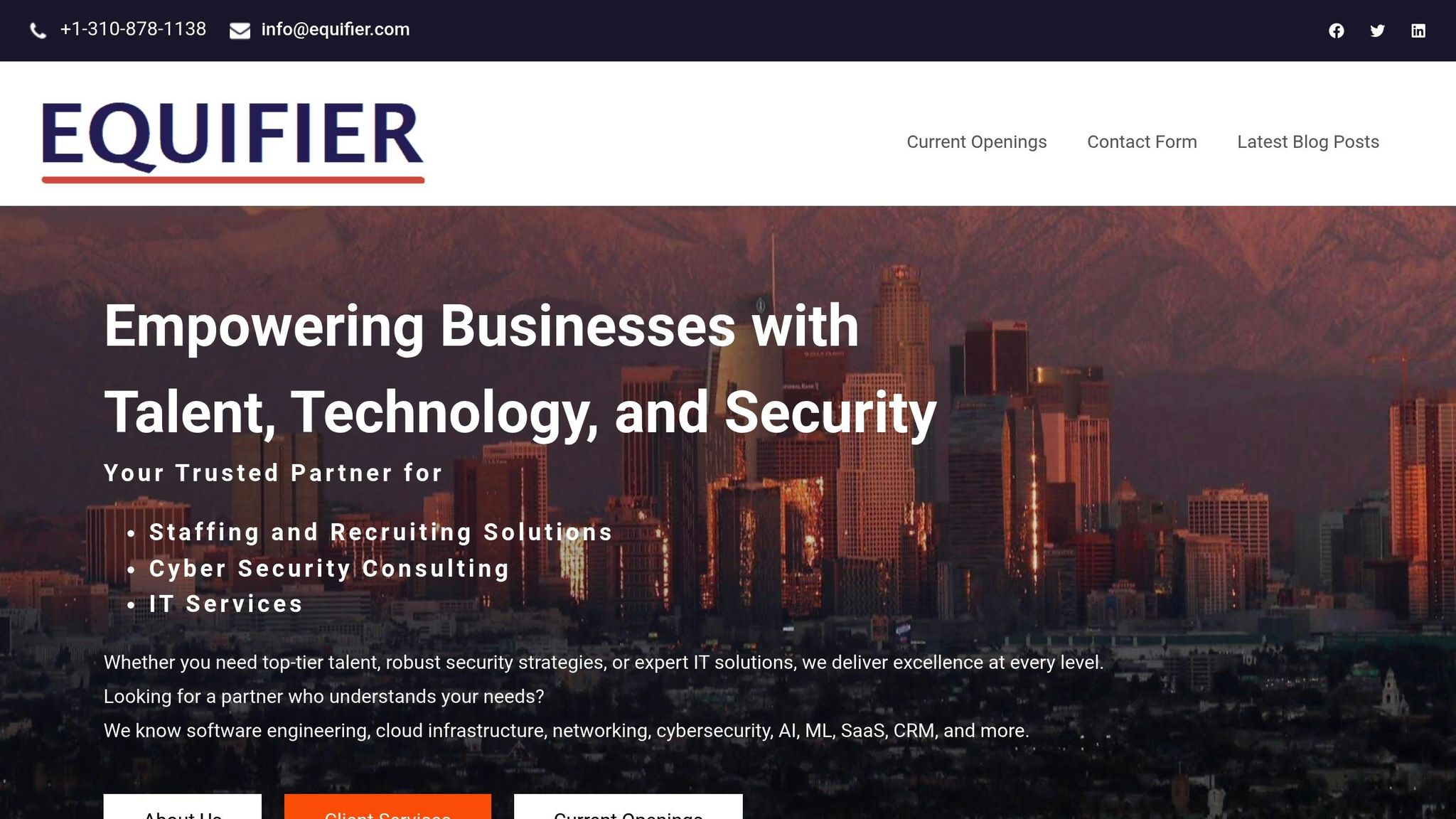Need cybersecurity experts fast? Temporary IT staffing is the answer.
This approach brings in skilled professionals on short-term contracts to tackle urgent cybersecurity challenges like compliance deadlines, incident response, and specialized projects. It’s faster than hiring full-time employees, saves costs, and provides access to experts with the exact skills you need.
Why Choose Temporary IT Staffing for Cybersecurity?
- Quick Deployment: Experts can start within days, not months.
- Cost Savings: Pay only for the project duration, avoiding long-term expenses.
- Specialized Expertise: Access skills for tasks like penetration testing, ransomware response, and cloud security.
- Flexibility: Scale your team up or down based on project needs.
- Reduced Hiring Risks: Test professionals during projects before committing long-term.
From meeting compliance standards like HIPAA and PCI DSS to managing zero-day vulnerabilities or securing cloud migrations, temporary staffing solves immediate needs without the delays of traditional hiring.
Equifier, a staffing agency, specializes in connecting businesses with cybersecurity experts quickly, ensuring you get the right talent for your critical projects.
Key Cybersecurity Challenges Requiring Temporary IT Staffing
Compliance with Regulations
When it comes to regulatory compliance, challenges often peak as audit deadlines approach. For instance, meeting HIPAA requirements involves a deep understanding of data encryption, access controls, and breach notification protocols. Healthcare organizations frequently discover compliance gaps too late, requiring immediate intervention from experts who can address these issues swiftly.
Similarly, PCI DSS compliance presents a tough hurdle for retailers and e-commerce businesses. This standard demands specific measures like network segmentation, vulnerability scanning, and secure payment processing – areas where internal teams may lack the necessary expertise. Temporary IT specialists can step in to close these gaps quickly, helping businesses avoid hefty fines.
State-level regulations, such as the CCPA, add another layer of complexity. Organizations often need temporary privacy experts to implement data handling procedures that align with multiple regulatory frameworks.
Then there’s SOX compliance, which involves implementing IT controls and ensuring proper segregation of duties. This often requires advanced technical knowledge in areas like database security, change management, and access controls – skills that internal teams may not possess. Temporary IT professionals can be instrumental in meeting these stringent requirements on time.
While compliance is an ongoing concern, the unpredictable nature of cyber threats calls for rapid and decisive action when incidents occur.
Incident Response and Threat Management
Security incidents demand immediate attention and expertise. Ransomware attacks, for example, often require specialized forensic skills that most organizations simply don’t have on hand. Quick action is critical to containing the damage and speeding up recovery.
Advanced Persistent Threats (APTs) bring their own set of challenges. These incidents require expertise in network forensics, malware analysis, and threat hunting. Temporary incident response specialists can step in, bringing the tools and experience needed to contain threats quickly while preserving evidence for any potential legal action.
Business email compromise (BEC) attacks are becoming increasingly sophisticated. These incidents often require immediate measures like hardening email security, implementing user training, and enhancing monitoring systems. Without rapid intervention, BEC attacks can lead to significant financial losses. Temporary experts can help by setting up email authentication protocols, delivering targeted training, and reinforcing monitoring systems to prevent future breaches.
Crisis situations involving zero-day vulnerabilities – like the infamous Log4j flaw – demand swift action. Organizations need experts who can quickly identify affected systems, apply workarounds, and manage comprehensive patching efforts to minimize risk.
While incident response tackles immediate threats, some projects require highly specialized skills that temporary staffing can provide on a short-term basis.
Support for Specialized Projects
Certain projects, such as cloud migrations, often reveal hidden security gaps. Temporary specialists can design secure architectures, enforce robust identity controls, and ensure compliance with industry standards – tasks that may exceed the expertise of internal teams.
Vulnerability assessments and penetration testing are another area where short-term expertise is invaluable. These processes require advanced skills to uncover and address critical security risks effectively. Temporary professionals can step in to perform these assessments and ensure systems are secure.
When organizations undergo digital transformations or navigate mergers and acquisitions, security architecture reviews become essential. Temporary security architects can evaluate existing systems, identify potential integration risks, and design solutions that align with the organization’s evolving needs.
Additionally, temporary specialists can set up automated systems for compliance monitoring and vulnerability scanning, helping organizations stay ahead of regulatory requirements while streamlining their processes.
Benefits of Temporary IT Staffing for Cybersecurity
Quick Access to Expertise
When cybersecurity threats arise or compliance deadlines loom, temporary IT staffing provides an immediate solution with project-specific expertise.
Take, for example, the need for SOC (Security Operations Center) support during a critical incident. Organizations require professionals who are already familiar with SIEM platforms, threat detection methods, and escalation protocols. Temporary specialists can jump in without lengthy onboarding, quickly assessing systems, identifying vulnerabilities, and proposing fixes – often within days instead of weeks.
This type of staffing delivers highly targeted expertise for specific needs. Whether it’s a CISSP-certified security architect for a cloud migration or a forensic analyst for an incident investigation, temporary roles connect companies with the exact skills they need, precisely when they need them. This rapid deployment not only mitigates immediate risks but also helps control costs by avoiding long-term commitments.
Cost-Effectiveness and Flexibility
Hiring permanent cybersecurity professionals can cost upwards of $150,000 annually when factoring in benefits and overhead. Temporary staffing eliminates these long-term expenses while still providing access to top-tier expertise.
For project-based needs, temporary staffing is especially cost-efficient. Organizations only pay for the duration of the project, often realizing 30-50% savings compared to the cost of a full-time hire.
Flexibility is another major advantage. Cybersecurity demands fluctuate due to business cycles, regulatory shifts, and evolving threats. Temporary staffing allows companies to scale their teams up or down as needed, avoiding the complexities of hiring or layoffs. This adaptability is particularly valuable during events like mergers, acquisitions, or large-scale system upgrades.
Additionally, temporary professionals often come with up-to-date certifications like CISSP, CISM, or CEH. This means companies gain immediate access to advanced knowledge without the time or expense of training their existing teams.
Comparison: Temporary vs. Permanent Staffing
| Factor | Temporary Staffing | Permanent Staffing |
|---|---|---|
| Time to Deploy | 1-2 weeks | 2-6 months |
| Cost Structure | Project-based, no benefits | Salary + benefits + overhead |
| Expertise Level | Immediate specialized skills | Requires training and development |
| Flexibility | Easy to scale up/down | Difficult to adjust team size |
| Commitment | Short-term, project-focused | Long-term investment |
| Risk | Lower financial risk | Higher financial commitment |
| Knowledge Transfer | Limited to project duration | Builds internal capabilities |
| Cultural Fit | Less critical for short projects | Essential for team integration |
The decision between temporary and permanent staffing depends on the scope and duration of cybersecurity needs. For long-term operations and strategic initiatives, permanent staff provide continuity and institutional knowledge. However, for urgent projects, specialized tasks, or fluctuating demands, temporary staffing offers unmatched speed, flexibility, and cost efficiency.
Many organizations strike a balance with a hybrid approach – maintaining a core team of permanent cybersecurity professionals while supplementing with temporary experts during peak periods or for specialized projects. This method ensures consistent oversight while retaining the agility to tackle immediate challenges effectively.
Best Practices for Using Temporary IT Staff
Integration with Existing Teams
When bringing temporary IT staff on board, a smooth integration process is essential. Start with a well-structured onboarding plan. Ensure they have quick access to the tools and systems they’ll need, provide clear and concise project documentation, and introduce them to key team members right away. This approach helps reduce downtime and allows them to contribute effectively from the get-go. A phased onboarding process can further ease their transition, aligning with the advantages of rapid deployment and specialized expertise mentioned earlier.
sbb-itb-05efa2a
How Equifier Supports Temporary IT Staffing for Cybersecurity Projects

Specialized Recruiting for Cybersecurity Roles
Equifier’s recruitment team, made up of experienced software engineers and consultants, is dedicated to finding the right talent for cybersecurity roles. Their expertise allows them to quickly identify professionals who can tackle complex security challenges head-on.
The company has built a recruitment process that prioritizes speed, quality, and flexibility, ensuring that each hiring project receives focused attention. This is especially crucial when businesses face pressing cybersecurity threats or tight compliance deadlines. By incorporating AI-driven screening tools, Equifier can efficiently identify top-tier candidates, giving clients access to a diverse pool of qualified professionals.
"Our rigorously vetted candidates streamline the hiring process, saving your team valuable time." – Equifier
Equifier’s Contingent Search Services are designed for startups and small-to-midsize businesses (SMBs) that need temporary contract professionals. This approach provides immediate access to specialized cybersecurity expertise, creating a strong foundation for addressing critical security needs.
Complete Cybersecurity Support
Equifier doesn’t just stop at staffing. They take a more holistic approach to cybersecurity by combining temporary staffing solutions with broader security support. Their services include risk assessments, compliance solutions, IT infrastructure improvements, and cloud solutions. This ensures that temporary hires are seamlessly integrated into a well-rounded security strategy, addressing both immediate threats and long-term risks.
"Equifier has built a reputation for delivering elite IT talent and workforce solutions to industry leaders. We are expanding our expertise to offer Cyber Security and IT Consulting Services, ensuring businesses stay ahead in an increasingly digital and security-conscious world." – Equifier
By pairing staffing with these additional services, Equifier helps businesses build a stronger defense against today’s rapidly evolving cybersecurity threats. Their nationwide network further ensures access to top-tier professionals, no matter where they’re needed.
National Reach and Proven Expertise
Equifier’s extensive national network of candidates allows them to source specialized talent without being limited by geography. Using advanced AI tools, they refine job descriptions and evaluate candidate compatibility. This tech-driven approach ensures businesses can connect with cybersecurity experts who are well-versed in emerging threats and modern security technologies.
In addition, Equifier understands the unique challenges of managing cybersecurity risks within a contingent workforce. Their blend of technical recruiting expertise, comprehensive security support, and a wide-reaching candidate network provides businesses with a reliable solution for urgent cybersecurity needs. With Equifier, companies can secure the specialized talent they need while benefiting from a robust support framework to tackle today’s most pressing security challenges.
Information Technology Recruitment Firm – Search Solution Group
Conclusion: Addressing Cybersecurity Challenges with Temporary IT Staffing
Temporary IT staffing provides a practical solution for businesses across the United States grappling with urgent cybersecurity challenges. By offering quick access to skilled professionals, companies can tackle threats head-on without the delays associated with traditional hiring processes.
This approach not only ensures access to specialized expertise but also offers flexibility by aligning talent with specific project needs. It’s particularly useful for industries like healthcare and finance, where meeting compliance deadlines and managing software migrations are critical to safeguarding sensitive information. Plus, it can save costs by avoiding the long-term commitment of permanent hires.
Another key benefit is risk reduction. Temporary staffing agencies, such as Equifier, help manage compliance requirements and handle administrative tasks, minimizing regulatory risks. They also allow businesses to evaluate a candidate’s fit before committing to a long-term arrangement.
Equifier takes this concept further by providing more than just staffing solutions. Their services include risk assessments, compliance support, and IT infrastructure optimization, giving businesses a well-rounded cybersecurity defense strategy. With a broad network of candidates and nationwide reach, Equifier ensures companies can access top-tier talent, no matter their location.
As cyber threats evolve and compliance standards become stricter, the ability to act swiftly is crucial. Temporary IT staffing offers organizations the agility they need to strengthen their cybersecurity defenses, combining immediate expertise, reduced administrative hassle, and scalable solutions. It’s a smart strategy for staying ahead in today’s fast-moving digital environment.
FAQs
How can temporary IT staffing help businesses meet urgent cybersecurity compliance deadlines?
Temporary IT staffing offers businesses a fast solution for bringing in skilled cybersecurity professionals to handle pressing compliance requirements. These specialists can step in to implement essential security protocols, perform thorough risk assessments, and ensure the company meets tight deadlines imposed by regulatory authorities or industry standards.
With temporary IT staff, companies can adjust their workforce on demand, manage urgent projects effectively, and uphold strong security practices – all without overwhelming their current teams. This adaptable strategy helps businesses stay on top of compliance needs while keeping operations running smoothly.
What are the cost advantages of using temporary IT staffing for cybersecurity projects?
Using temporary IT staffing for cybersecurity projects can be a smart way to manage costs. Instead of dealing with expenses tied to full-time employees – like benefits, payroll taxes, and long-term commitments – businesses can opt for a more budget-friendly solution. Plus, because temporary staff are already trained, you can skip the time and money spent on onboarding.
This approach also gives companies the flexibility to adjust the size of their cybersecurity teams based on current needs. Whether it’s for an urgent issue or a short-term project, temporary staffing ensures you have the right resources without stretching your budget. It’s a practical way to tackle pressing cybersecurity demands while keeping spending in check.
How can temporary IT professionals seamlessly join existing teams to address urgent cybersecurity challenges?
Temporary IT professionals can quickly become valuable contributors to existing teams by emphasizing effective communication, organized onboarding, and team collaboration. A thoughtfully designed onboarding process should cover cybersecurity training, a clear overview of company policies, and access to necessary tools – all while maintaining strict security measures.
To promote seamless teamwork, holding regular team meetings and setting shared objectives can align temporary staff with current projects and workflows. Creating an environment that encourages open dialogue and mutual support allows these professionals to adapt quickly and play a key role in addressing urgent cybersecurity challenges while adhering to the organization’s security protocols.









